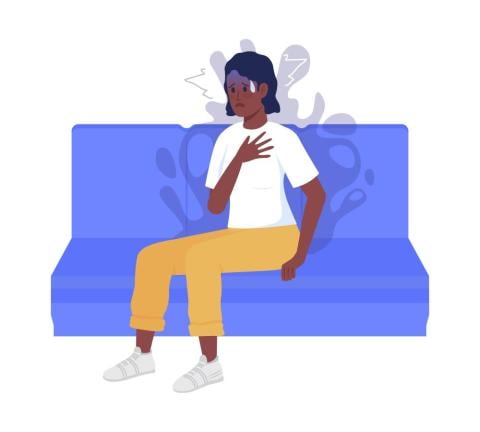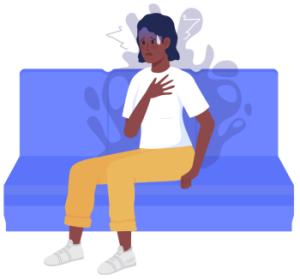Did You Know?
- In 2020, an estimated 14.8 million U.S. adults aged 18 or older had at least one major depressive episode with severe impairment in the past year. NIMH: Major Depressive Disorder
- Rates of depression were higher among young adults between the ages of 18 and 29. CDC
- Around 39% of adults with major depressive episodes did not receive treatment. NIMH: Major Depressive Disorder
- 10.6% of physician office visits with depression indicated on the medical record. CDC
- 4.6% of adults aged 18 and over with regular feelings of depression. CDC
- An estimated 4.1 million adolescents aged 12 to 17 in the United States had at least one major depressive episode.
- The rates of depression have been rising among adolescents in the United States. Greater than 1 in 20 children aged 6 to 17 in the United States, in 2011-2012, were found to have current anxiety or depression by parent report. (Bitsko et al 2018)
- About 60% of adolescents with a major depressive episode did not get treatment. NIMH: Major Depressive Disorder
- What is Depression? ADAA video
Major Depressive Disorder (MDD)
- The leading cause of disability in the U.S. for ages 15 to 44; MDD can develop at any age, the median age at onset is 32.5 years old. NIMH: Major Depressive Disorder.
- Nearly 21% of adults in the United States will go on to develop Major Depressive Disorder at some point in their lives (Hasin et al).
- MDD affects more than 21 million American adults or about 8.4% of the U.S. population age 18 and older in a given year.
- Almost 49% of adults with MDD are not receiving treatment.
- MDD is more prevalent in women than in men.
- What is Major Depressive Disorder (MDD)? ADAA video
Depression is the leading cause of disability worldwide as measured by Years Lived with Disability. Almost 75% of people with mental disorders remain untreated in developing countries with almost 1 million people taking their lives each year. In addition, according to the World Health Organization (WHO), 1 in 13 people globally suffers from anxiety. The WHO reports that anxiety disorders are the most common mental disorders worldwide with specific phobia, major depressive disorder and social phobia being the most common anxiety disorders. (NIMH)
Join ADAA's free peer to peer Major Depressive Disorder online support group.
Persistent Depressive Disorder or PDD (formerly called dysthymia) is a form of depression that usually continues for at least two years.
- PDD affects approximately 3.1 million adults or 1.5% of the U.S. population age 18 and older in a given year. The average age of onset is 31 years old. (WHO)
ADAA Depression Resources
Webinars
- Depression: How to Recognize it and How to Treat it
- Can Yoga Help with Depression? What Does the Research Say?
- Depresión y ansiedad en niños/Anxiety and Depression in Children - Spanish psychoeducational video
- Depresión/Depression
- Depression Among College Students
- Depression and Heart Disease: Chicken and the Egg, and What You Can Do
- For My Anxiety or Depression: Should I Use Medication or Therapy?
- How to Help Depressed and Suicidal Teenagers
- Asking Your Pharmacist About Medications for Anxiety and Depression
- Anxiety, Depression, and the LGBTQ Community: Thriving Through the Challenges
- Exercise Against Anxiety and Depression
- Our Kids: Anxiety and Depression
- Treatments for Anxious and Depressed Kids and Teens
- Bullying, Anxiety, and Depression
- What Is Cognitive-Behavioral Therapy and How Is It Used to Treat Anxiety and Depression?
- Depression: What You Need to Know About Medications
- Genetics of Depression and Anxiety: What Do Clinicians Need to Know?
- Mindfulness Over Matter: Integrating Mindfulness Into the Treatment of Depression - Presented in Partnership with The Child Mind Institute
- Management of Treatment-Resistant Depression
- Introduction to the Magic of CBT for Anxiety, OCD, and Depression
- Psychotherapy for GAD and Comorbid Major Depression
Blog Posts
- Childhood Depression
- Watch, Ask and Listen: How to Tell if Your Child or Teen is Anxious or Depressed
- How Do You Talk to Your Loved One Suffering With Depression?
- Revolutionizing Depression Treatment with Digital Therapeutics
- Dealing with Valentine's Day Depression
- Criticism: Depression and Anxiety
- Can CBD Help with My Anxiety and Depression
- Influences of Cultural Differences in the Diagnosis and Treatment of Anxiety and Depression
- Revolutionizing Depression Treatment with Digital Therapeutics
- Heart Disease and Depression Often Go Hand in Hand: WomenHeart Can Help
- Depression Among College Students
- Anxiety and Depression in Sexual and Gender Minority Individuals
- Dr. Chris’s Techniques For Lessening Anxiety And Depression
- Seniors Coping with Anxiety and Depression
- Depression and Daily Life
- Alleviating Anxiety, Stress and Depression with the Pet Effect
- What is Depression and How Do I Know If I Have It?
- Women and Depression
- Depression Treatment – It Works
- Understanding Anxiety and Depression for LGBTQ People
Videos
Stories of Triumph
- Your “Strong” Friends Need Checking in on Too: Despair and High Functioning Depression
- Lighting the Way for Others: Hope and Life Renewed
- How to Fight Against GAD
- In The Life of Sam
- My Own Hero's Journey
ADAA Additional Resources
- Find an ADAA Therapist
- ADAA's Free Peer-to-Peer Online Community
- ADAA National Support Group Listing
- Types of Therapy
- Types of Mental Health Care Professionals
- Medication
Community Resources
- National Institute of Mental Health
- World Health Organization
- Depression and Bipolar Support Alliance
- Hope for Depression Research Foundation
- BlueCross BlueShield
- Child Mind Insititute
- Let's Talk About Depression, HealthCentral.com (Jan/Feb 2020) - Series of articles about the signs, types, and treatment for depression disorders, with ADAA CMO and Board Member Dr. Charles Nemeroff.
- Faster and Easier Approaches for Improving Patients' Depression Treatment Outcomes, CareForYourMind.org, ADAA Member Michael Thase, MD
- I Had a Black Dog, His Name Was Depression
- Major Depression: The Impact on Overall Health
- Depression Stories on The Mighty
- Disability Benefits
- Depression and Bipolar Support Alliance (DBSA)
- 6 Ways You Can Help an Older Adult with Depression, Junomedical.com
Trending Articles
U.S. Depression Rates Reach New Highs, May 2023
Content on this page was provided by ADAA member Richa Bhatia, MD, FAPA, Dual Board Certified Psychiatrist on November 2, 2020
References on this page:
-
https://www.samhsa.gov/data/sites/default/files/cbhsqreports/NSDUHDetailedTabs2017/NSDUHDetailedTabs2017.pdf. Accessed on Nov 1, 2020.
-
https://www.nimh.nih.gov/health/statistics/major-depression.shtml. Accessed on Nov 1, 2020.
-
https://www.cdc.gov/nchs/fastats/depression.htm. Accessed on Oct 25, 2020.
-
Hasin DS, Sarvet AL, Meyers JL, et al. Epidemiology of Adult DSM-5 Major Depressive Disorder and Its Specifiers in the United States. JAMA Psychiatry. 2018;75(4):336–346. doi:10.1001/jamapsychiatry.2017.4602
-
https://www.who.int/news-room/fact-sheets/detail/depression. Accessed on Nov 1, 2020.
https://www.nimh.nih.gov/health/publications/chronic-illness-mental-health/index.shtml. Accessed on Oct 25, 2020. -
Bitsko RH, Holbrook JR, Ghandour RM, et al. Epidemiology and Impact of Health Care Provider-Diagnosed Anxiety and Depression Among US Children. J Dev Behav Pediatr.
2018;39(5):395-403. doi:10.1097/DBP.0000000000000571 -
Katon WJ. Epidemiology and treatment of depression in patients with chronic medical illness. Dialogues Clin Neurosci. 2011;13(1):7-23.
-
Steffen, A., Nübel, J., Jacobi, F. et al. Mental and somatic comorbidity of depression: a comprehensive cross-sectional analysis of 202 diagnosis groups using German
nationwide ambulatory claims data. BMC Psychiatry 20, 142 (2020). https://doi.org/10.1186/s12888-020-02546-8 -
Van der Kooy K, van Hout H, Marwijk H, Marten H, Stehouwer C, Beekman A.Depression and the risk for cardiovascular diseases: systematic review and meta analysis. Int J Geriatr Psychiatry. 2007 Jul;22(7):613-26. doi: 10.1002/gps.1723. PMID:17236251.
-
Spijkerman T, de Jonge P, van den Brink RH, Jansen JH, May JF, Crijns HJ, Ormel J. Depression following myocardial infarction: first-ever versus ongoing and recurrent episodes. Gen Hosp Psychiatry. 2005 Nov-Dec;27(6):411-7. doi: 10.1016/j.genhosppsych.2005.05.007. PMID: 16271655.
-
Mezuk B, Eaton WW, Albrecht S, Golden SH. Depression and type 2 diabetes over the lifespan: a meta-analysis. Diabetes Care. 2008 Dec;31(12):2383-90. doi: 10.2337/dc08-0985. PMID: 19033418; PMCID: PMC2584200.
-
Oladeji BD, Gureje O. The comorbidity between depression and diabetes. Curr Psychiatry Rep. 2013 Sep;15(9):390. doi: 10.1007/s11920-013-0390-3. PMID: 23933977.
-
https://www.cdc.gov/aging/mentalhealth/depression.htm. Accessed on Nov 1, 2020
Note: This website page is for informational purposes only and is not intended to provide medical or psychiatric advice or recommendations, or diagnostic or treatment opinion. This is not a complete review or description of this subject. If you suspect a medical or psychiatric condition, please consult a health care provider. All decisions regarding an individual’s care must be made in consultation with your healthcare provider, considering the individuals’ unique condition. If you or someone you know is struggling, please contact the 24x7, confidential National Hotline at 1-800-273-8255 or use the crisis text line by texting HOME to 741741 in the US, or go to http://www.suicide.org/international-suicide-hotlines.html for the suicide hotline number for your country.

















